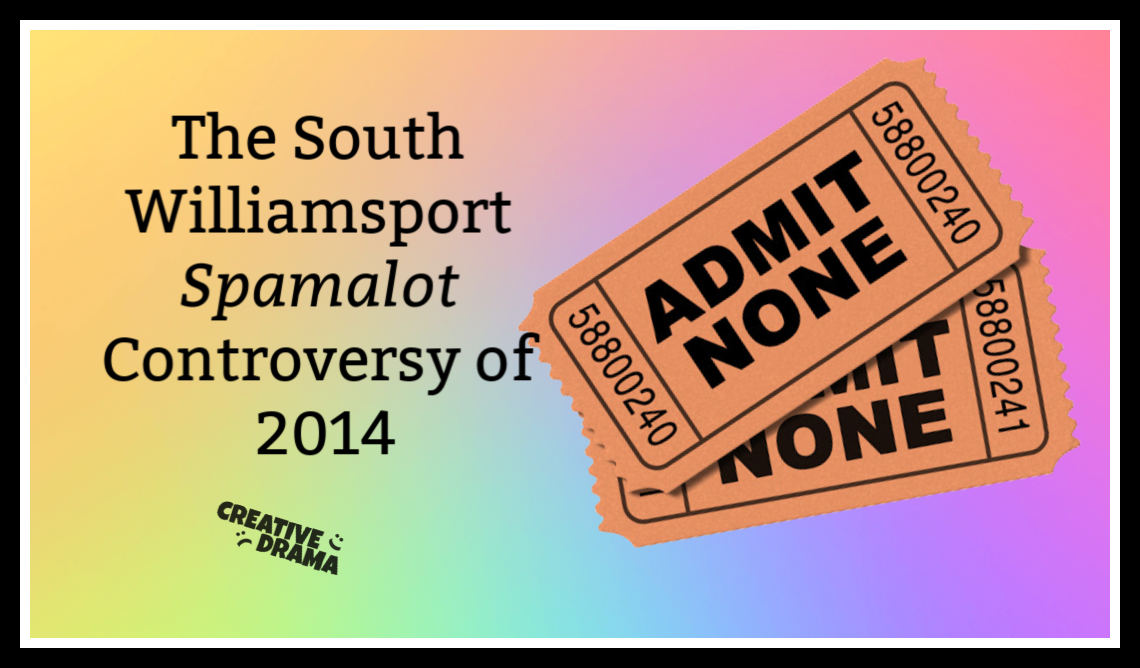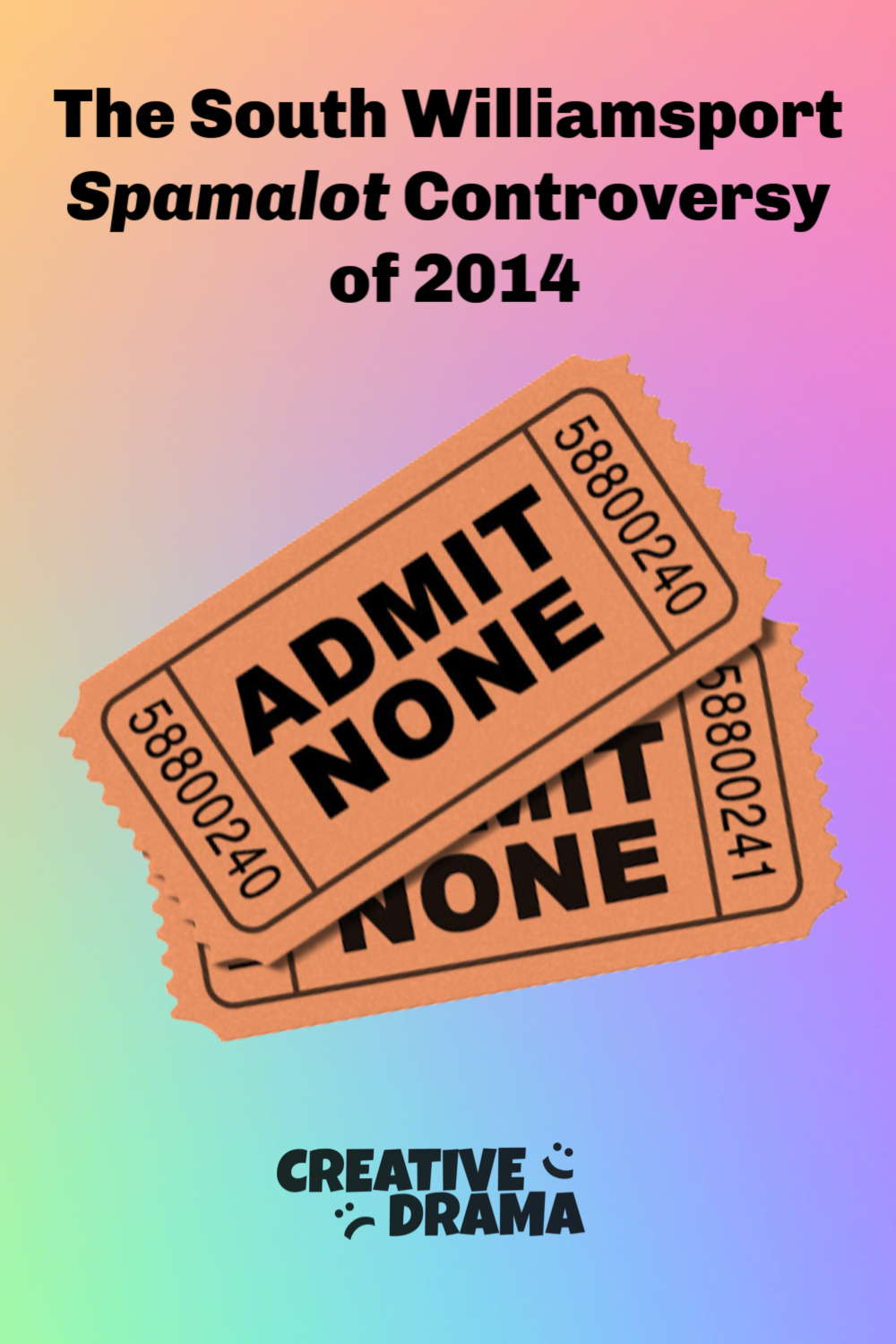Pennsylvania High School cancels planned production of Spamalot

If you follow educational theatre, or theatre in general, you may have heard about the Spamalot controversy at South Williamsport Junior/Senior High School in 2014. Essentially, the administration canceled an already-contracted production of Spamalot due to concerns about content. South Williamsport is a tiny school district, with under 700 students in the 7-12 Junior/Senior High School.
Redacted Documents and Spurious Reasons
After conflicting reports in local media, Keystone Progress, a progressive network, used Pennsylvania’s right-to-know law to obtain documents relating to the incident. You can access the obtained documents (with redactions!) from the article on Keystone Progress’ website.
In a June 30, 2014 email to Drama Director Dawn Burch, Principal Jesse Smith opened by stating that he had spoken with the Superintendent about the “appropriateness” of last year’s shows (which were Harvey and How to Succeed in Business Without Really Trying). After stating that Superintendent Mark Stamm gave him leeway to “disallow any productions (he) didn’t feel comfortable with.” Smith listed his two arguments against Spamalot and “its homosexual themes.”
“Drama productions are supposed to be community events. They are supposed to be performances that families can attend. To me, this type of material make (sic) it very hard for that to take place. I don’t want members of the community staying home because they feel the material is too risque or controversial.”
It’s difficult to argue that Spamalot is appropriate for “all ages;” the bawdy and irreverent humor is over the heads of most elementary school students. Requiring that school productions be appropriate for “all ages” sounds like an acceptable stance, but it’s not policy or past practice at the school. In 2012, South Williamsport produced Pippin. It’s a delightful show with wonderful music – it also includes patricide, promiscuity, war, and a finale that incites the protagonist to immolate himself. Other past productions include Grease and Bye Bye Birdie, shows which have teenage characters drinking, smoking, and mooning.
Smith’s second point is:
“I think that choosing productions with this type of material or productions that may be deemed controversial put (sic) students in a tough spot. I don’t want students to have to choose between their own personal beliefs and whether or not to take part in a production. I think there are many plays/musicals you can choose from that don’t rise to that level.”
The antecedent for the indefinite pronoun “this” is “homosexual themes” from the opening paragraph; I’m not sure what Smith means by “rise to that level;” maybe it has to do with the amount of controversy the show is causing.
More troubling is Smith’s lack of basic knowledge about the dramatic arts. The difference between an actor and the role he plays is a basic convention of the theatre. Actors must be able to separate the actions and personalities of the characters they play from themselves. Even children playing the Big Bad Wolf in a creative drama class understand that while it’s fun to pretend to huff and puff and blow down houses, it doesn’t mean that they are advocating pig domicile destruction in real life. Gay actors have been portraying heterosexual characters for thousands of years; now that there are (more numerous) LGBTQ characters to portray, straight actors will be portraying them.
In an August 31st article, the Sun-Gazette presented the information from the emails and interviewed Burch, Stamm, and Smith again. The principal elaborated:
“I don’t want kids to feel like they had to choose between performing and what they felt was controversial material. They should be able to sign up for a play and know that it’s school-sponsored and they won’t have to make a moral or ethical decision…I just want students to feel free to join the play and not feel like they are compromising their views based on the content,” he added.
Again, while actors work to understand the motivations for their characters’ behavior, and the psyche that contributes to those actions, they know that portraying a person doesn’t mean they must take on all of the character’s traits. I can’t imagine a 16-year-old turning down Mrs. Lovett in Sweeney Todd: “I’m sorry, I just don’t believe in feeding human flesh to people without their knowledge. Cannibalism is WRONG.”
Using Principal Smith’s logic, a Neo-Nazi student could stop a production of I Never Saw Another Butterfly by arguing that she believes the existence of the Holocaust is controversial.
Even Worse Justifications for Censorship…
The South Williamsport district administration’s denial of the real reasons for cancelling the show, along with rumors that someone had supplied tips and privileged communications to the press, exacerbated the controversy over the selection of Spamalot. The press erroneously reported that Principal Smith stated homosexuality didn’t exist in South Williamsport. Then the South Williamsport School Board started talking, and made things worse. President John J. Engel, as reported on PennLive.com:
“Homosexuality did not enter into that decision, Engel said. It was the case the play was not appropriate for a school production, he said. There are gays and lesbians in the district and they have appeared in plays in the past, he said.”
This sounds as if Engel’s worried that people think that LGBTQ students aren’t being cast in productions. If so, he’s confusing a student actor’s being allowed to portray a gay character with their actually being gay.
From the administration’s defensive remarks, it seems like the original objection to Spamalot came from a student or students. The first document in the right-to-know release is an email Principal Smith sent to Superintendent Stamm. It contains the text of an email Smith sent to Burch and it’s mostly redacted, but Stamm’s response to Smith’s email on the morning of June 28th says, “Good honest feedback from the students.” One of the reasons given for redacted material in the documents is “references to a minor;” it’s possible that a vocal student or students brought their objection or concern about their parents’ refusal to allow them to participate to Principal Smith.
In the Sun-Gazette article, Smith insisted that he wasn’t trying to tread on student’s rights:
“I’m all for discussion on controversial topics, be it the Second Amendment, gay rights or abortion, but there’s a time and place for that in the classroom…There’s a process there and a facilitator (the teacher). When you have a controversial issue in a school play, it’s already determined what direction it’s going to go because the play is already written. Where does that leave the kid who disagrees with it? They have to make a decision on whether or not to participate.”
The literary works in an English class are “already written” as well. It doesn’t stop South Williamsport students from reading John Knowles’ A Separate Peace, or Lorraine Hansberry’s A Raisin in the Sun, texts which contain “controversial” material*. Burch is not a contracted teacher in the district, but the district staff who put her in the extracurricular position should have confidence that she can shepherd a cast through the production of difficult texts. Burch’s introductory letter on South Williamsport’s website doesn’t indicate a degree in education or theatre, but she has many years of experience working with young people and working in community theatre. There’s also some indication that she has faculty members assisting her, and they should be able to direct discussion just as they would in their classrooms.
Dealing with Concerns About Content
As with many recent Broadway musicals released for high school performance, the creators and licensors have considered the issues of “appropriateness.” Theatrical Rights Worldwide has extensive notes (go to “Resources” and then “FAQs” here) on permissible line cuts or changes to lines in Spamalot – if “fart” isn’t acceptable language at a school, the creators suggest “flatulence.” For the number that “outs” Lancelot, they provide the following:
“His Name Is Lancelot” – This song can be toned down a bit if necessary. The codpiece and banana are not necessary. Use your own creative staging and have fun with it.”
They do not allow productions to cut the song or Lancelot’s wedding. There’s only so far one can go in removing objectionable content from a production; at some point, it’s just Bowdlerizing and there’s no reason to do a play so far removed from its original script.
In an interview with Playbill.com, Dawn Burch revealed that the administration was putting in place “new guidelines…to find material deemed appropriate for school-age audiences and performers. There had not been a clear selection process in place prior to the Spamalot controversy.” But the guidelines may hobble their choices: “I think that they’re picking apart musicals,” she said. “Even in classics there are things there that people can find offensive.”
The officially approved fall production at SWJSHS is Alice in Wonderland. If the school district, the students, and the community feel more comfortable limiting the high school’s drama department to children’s theatre and other G-rated productions, it’s their prerogative. But everyone needs to understand that it puts SWJHS students at a disadvantage in their theatre education. South Williamsport doesn’t seem to have any theatre electives;** it’s not unusual for a small school. The best high school theatre programs give their student actors the opportunity to experience a wide variety of styles and perform challenging pieces, in classes and in public performance. (For a great example of how this is done, read Michael Sokolove’s Drama High, about a theatre teacher and program that pushed the envelope of high school productions.)
There are other reasons why a high school would not choose Spamalot for their school musical. There’s only one featured female role; in addition to the suggested 5 in the ensemble, Theatrical Rights International suggests that many of the smaller male parts could be played by females (either by their acting as males or changing the gender’s role). Maybe Burch planned on casting females in other leading roles (the Pythons performed in drag a lot). It’s also a show with a lot of technical requirements. The set needs to have multiple levels for many of the scenes to work, there are special effects, and the costumes are no joke (even though they parody classic cinematic portrayals of King Arthur’s court).
This controversy in a very small school district has a significant takeaway for educational theatre. If your school doesn’t have selection guidelines in place for choosing productions, you should get the administration (up through the school board and superintendent) to agree to some. The Educational Theatre Association has two divergent examples on their website.
NOTES
*In order to find out what texts are in South Williamsport’s English curriculum, I had to visit the staff pages on the junior/senior high school’s website and click on teachers names until I found English teachers who had posted information about class assignments on their individual pages.
**I couldn’t locate a course catalog or list on South Williamsport’s website. I could be wrong in my deduction that they don’t have any theatre electives, but I didn’t come across any teachers (in the above search) who were listed as teaching theatre.
I performed the research for this post from September-December 2014; information contained therein was current as of that date.
The links contained in this post were live in December 2014.
UPDATE July 1, 2020 – I just discovered another 2014 incidence of a high school’s cancelling a planned production, and ironically, it’s Sweeney Todd: The Demon Barber of Fleet Street – the same musical I used for an example of how actors often play roles that don’t match up with their own ethics. The administration/superintendent of Timberlane Regional High School said it was “uncomfortable with the script” and wanted something “more suited for the community.” Superintendent Metzler also said there were students who “…didn’t want to be in the production because of the subject area,” so maybe I was wrong in thinking that a student wouldn’t reject the role of Mrs. Lovett.
Timberlane did produce the show (after community outcry) and Stephen Sondheim wrote a note to the cast and crew.






